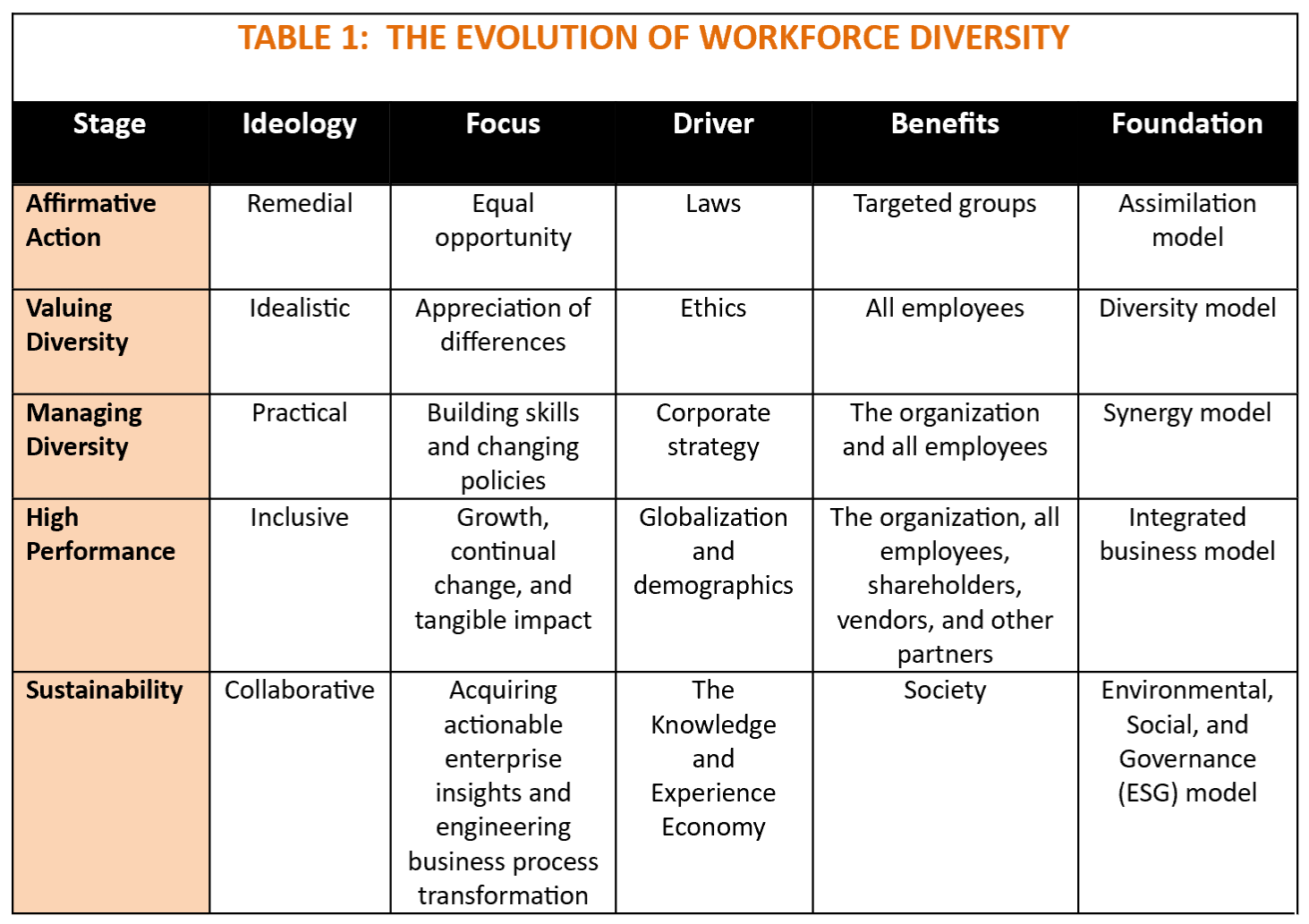Evolution of DEIA
The evolution of Diversity, Equity, Inclusion, and Accessibility (DEIA) in the workplace has been a long and winding road. It started when people began to demand equal rights for all, regardless of race, ethnicity, gender, or sexual orientation. In the decades since, DEI has become increasingly important in the workplace, as businesses have realized that a diverse and inclusive workforce is essential for success.
Many factors have contributed to the evolution of DEI at work. One is the changing demographics of the workforce. The United States is becoming increasingly diverse, and businesses need to reflect this Diversity in their workforces to be successful. Another factor is the rise of social media. Social media made it easier for people to share experiences of discrimination and bias, raising awareness of the need for DEI in the workplace.
DEI's evolution is ongoing. Much work needs to be done to create truly diverse, equitable, and inclusive workplaces. However, the progress that has been made so far is significant, and it's clear that DEIA is an essential component of the future of work.
The History of Diversity, Equity, Inclusion, and Accessibility in the United States of America
1957
The Civil Rights Act of 1957 establishes the Civil Rights Commission and the Department of Justice's Civil Rights Division.
1960
The Greensboro sit-ins begin, sparking a wave of nonviolent protests against segregation in the South.
1961
The Freedom Rides begin, challenging segregation in interstate travel.
1963
The March on Washington for Jobs and Freedom is held, with Martin Luther King, Jr. delivering his "I Have a Dream" speech.
The Equal Pay Act is passed, prohibiting sex discrimination in pay.
1964
The Civil Rights Act of 1964 prohibits discrimination on the basis of race, color, religion, sex, or national origin in public accommodations and facilities, employment, and education.
The Mississippi Freedom Democratic Party (MFDP) challenges the all-white delegation from Mississippi at the Democratic National Convention.
1965
The Voting Rights Act of 1965 prohibits discrimination in voting on the basis of race, color, or language minority status.
The Selma to Montgomery marches are held, demanding voting rights for African Americans in Alabama.
1966
The Black Power movement emerges, calling for more radical action to achieve equality. (Late 1960s)
1968
Martin Luther King, Jr. is assassinated in Memphis, Tennessee.
The Fair Housing Act of 1968 prohibits discrimination in housing on the basis of race, color, religion, sex, or national origin.
1969
The Supreme Court case Alexander v. Holmes County Board of Education rules that all schools must be desegregated "at once."
1971
The Supreme Court case Swann v. Charlotte-Mecklenburg Board of Education rules that school districts can use busing to achieve racial desegregation.
1972
Title IX of the Education Amendments of 1972 prohibits discrimination on the basis of sex in education programs and activities receiving federal financial assistance.
1973
The Supreme Court case Roe v. Wade legalizes abortion in the United States.
1974
The Supreme Court case Milliken v. Bradley rules that school districts cannot be required to desegregate across district lines.
1978
The Supreme Court case Regents of the University of California v. Bakke rules that affirmative action programs can be used to achieve diversity in higher education.
1989
The Supreme Court case Wards Cove Packing Co. v. Atonio rules that employers are not liable for discrimination unless they can show that they have a "business necessity" for their discriminatory practices.
1990
The Americans with Disabilities Act (ADA) is passed, prohibiting discrimination against differently abled persons in all areas of public life, including employment, education, transportation, and public accommodations.
1991
The Civil Rights Act of 1991 amends the Civil Rights Act of 1964 and provides for monetary damages in cases of intentional discrimination.
1995
The Million Man March is held in Washington, D.C., by African American men to promote unity and address issues facing the black community.
1996
The Supreme Court case Adarand Constructors, Inc. v. Pena rules that affirmative action programs must be "narrowly tailored" to achieve a "compelling government interest."
2003
The Supreme Court case Grutter v. Bollinger upholds the use of race as a factor in admissions decisions at the University of Michigan Law School.
2005
Hurricane Katrina devastates the Gulf Coast, disproportionately affecting African Americans.
2009
The Society for Diversity is founded to provide education, training, and certification programs for the field of DEI.
The Matthew Shepard and James Byrd Jr. Hate Crimes Prevention Act is signed into law by President Barack Obama. The act expands the 1969 United States federal hate-crime law to include crimes motivated by a victim's actual or perceived gender, sexual orientation, gender identity, or disability.
2013
The Supreme Court case Shelby County v. Holder strikes down the preclearance provision of the Voting Rights Act of 1965.
2014
The Supreme Court case Fisher v. University of Texas at Austin upholds the use of race as a factor in admissions decisions at the University of Texas at Austin.
2015
The Supreme Court case Obergefell v. Hodges legalizes same-sex marriage in the United States.
2020
The murder of George Floyd by police in Minneapolis, Minnesota, sparks nationwide protests against racial injustice.
The COVID-19 pandemic highlights the racial, economic, disability, and geographic disparities that exist in society.
The Supreme Court rules in the case of Bostock v. Clayton County, which expands the definition of employment discrimination to include discrimination based on sexual orientation and gender identity.
2021
Kamala Harris is sworn in as the first female, first Black and first Asian-American vice president.
The Biden administration announces a new initiative to address racial disparities in the criminal justice system. The initiative includes $350 million in funding for community-based programs and $1 billion for research on racial bias in policing.
The Supreme Court rules that police can be held liable for damages if they violate a person's constitutional rights. The ruling is a major victory for civil rights advocates.
The House of Representatives passes the George Floyd Justice in Policing Act again, with some changes. The bill is still pending in the Senate.
California passes a law that prohibits discrimination based on sexual orientation or gender identity in public accommodations, housing, and employment.
New York passes a law that requires all public schools to teach about the history of racism and discrimination in the United States.
2022
The House of Representatives passes the John Lewis Voting Rights Advancement Act, which would restore key provisions of the Voting Rights Act of 1965.
President Joe Biden signs an Executive Order on Advancing Racial Equity and Support for Underserved Communities.
The Emmett Till Antilynching Act is signed into law by President Biden, making lynching a federal hate crime punishable by up to 30 years in prison.
Ketanji Brown Jackson is confirmed to the Supreme Court, becoming the first Black woman to serve on the court.
The Supreme Court rules in the case of Vega v. Tekoh, holding that police officers can be sued for violating a person's Fourth Amendment rights even if they did not intend to do so.
The Supreme Court case Dobbs v. Jackson Women's Health Organization overturns Roe v. Wade, eliminating the constitutional right to abortion.
The Supreme Court rules in the case of Brnovich v. Democratic National Committee, upholding Arizona's law that restricts early voting and same-day voter registration.

